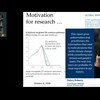dive
Asymmetries in punishment propensity may drive the civilizing process
Nature Human Behaviour, volume 2, pp. 148–155, doi:10.1038/s41562-017-0278-z Abstract Norms about hygiene and violence have both shown a tendency to become increasingly strict, in the sense that the han
Group differences in broadness of values may drive dynamics of public opinion on moral issues
Mathematical Social Sciences, 77, 1-8. Abstract Here we propose the idea that the success of an argument in favor of an issue position should depend on whether the argument resonates with the audience’s
Where are newcomers going to live? Perspectives from Malmö and Århus on Swedish and Danish refugee dispersal policies
Institute for Futures Studies, IFFS Report 2012/3, 82 p. During the last decade, Denmark and Sweden have become increasingly dissimilar in terms of migration policy. While Sweden has remained relativel
Julia Steinberger: Is it possible to live well within planetary limits? Evidence and modelling from the LiLi project
Professor Julia Steinbergerresearches and teaches in the interdisciplinary areas of Ecological Economics and Industrial Ecology. Her research examines the connections between resource use (energy and

Julia Steinberger: Is it possible to live well within planetary limits? Evidence and modelling from the LiLi project
Professor Julia Steinberger researches and teaches in the interdisciplinary areas of Ecological Economics and Industrial Ecology. Her research examines the connections between resource use (energy and
Towards a new research program
New director – new research focus. That is how it works at the Institute for Futures Studies. This means that the new director Gustaf Arrhenius will also act as a research director and is now creating
The Oxford Handbook of Population Ethics - Interview with the editors
If we can affect how many people will be born in the future, what does that mean for our decisions today? Would it be bad if much fewer people would exist in the future, as an adaption to climate chan
The page you were looking for could not be found
If you have questions, ideas or suggestions about improvements, please feel free to give us a call or send an e-mail:Telephone: +46 (8) 402 12 00E-mail: [email protected]
Power and Social Ontology
Bokbox Förlag, 188 pages. What is social power? How does it fit into the world of institutions, practices, rules, and norms in which we live our lives? Of what does the authority of a president or the
From Transfers to Individual Responsibility: Implications for Savings and Capital Accumulation in Taiwan and the United States
A demographically realistic model incorporating life cycle saving motives is used to simulate effects of changing a transfer-based old-age support to a funded system, applied to the cases of Taiwan an








